ICT Professional Practice and Ethics: Cambridge Analytica Case Study
VerifiedAdded on 2022/10/31
|16
|3824
|384
AI Summary
This report provides an analysis of the Cambridge Analytica data scandal from an ethical perspective using DET and ACS codes of ethics. It highlights the unethical and illegal extraction of personal data from Facebook users for political purposes and the implications of such actions.
Contribute Materials
Your contribution can guide someone’s learning journey. Share your
documents today.
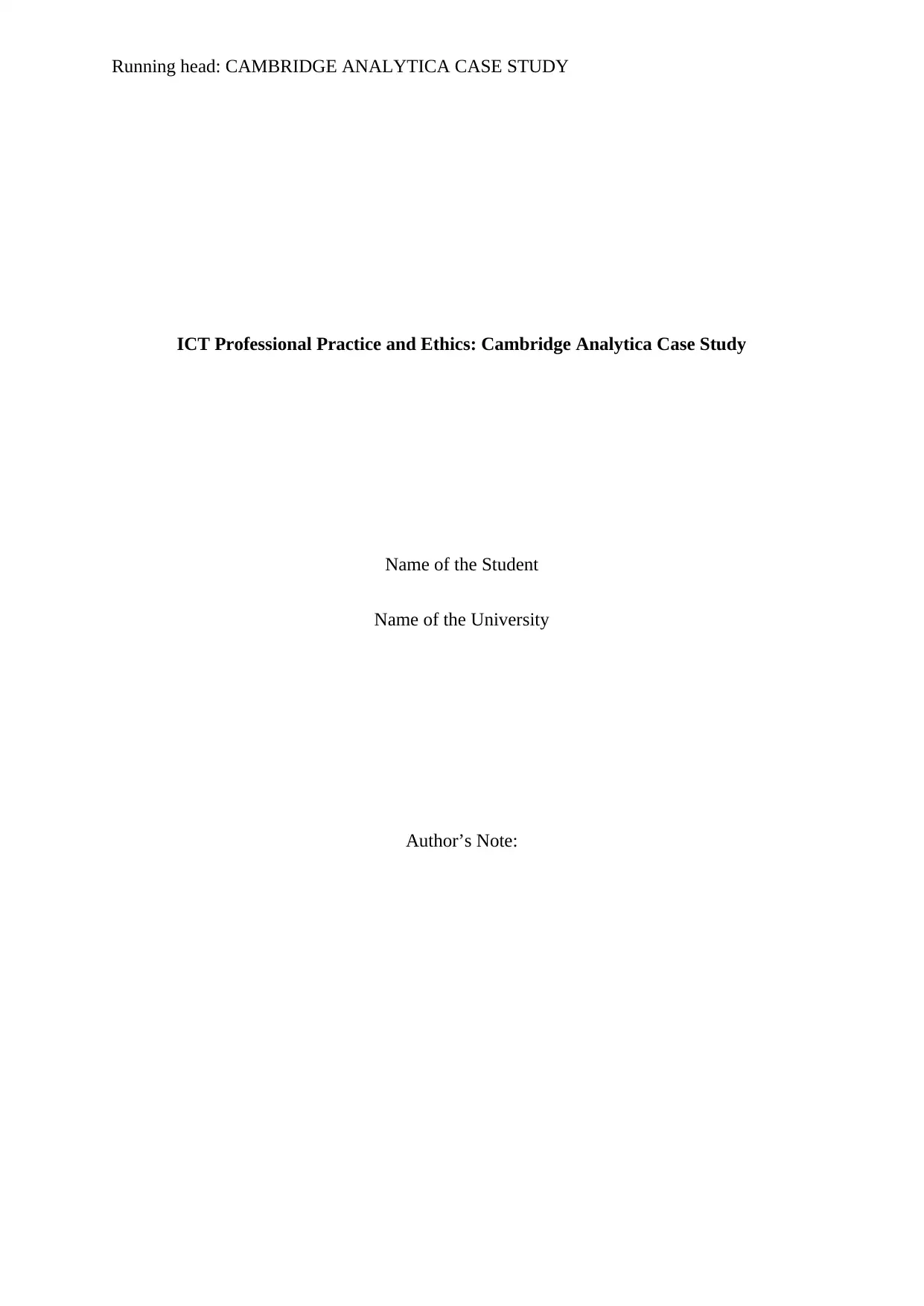
Running head: CAMBRIDGE ANALYTICA CASE STUDY
ICT Professional Practice and Ethics: Cambridge Analytica Case Study
Name of the Student
Name of the University
Author’s Note:
ICT Professional Practice and Ethics: Cambridge Analytica Case Study
Name of the Student
Name of the University
Author’s Note:
Secure Best Marks with AI Grader
Need help grading? Try our AI Grader for instant feedback on your assignments.
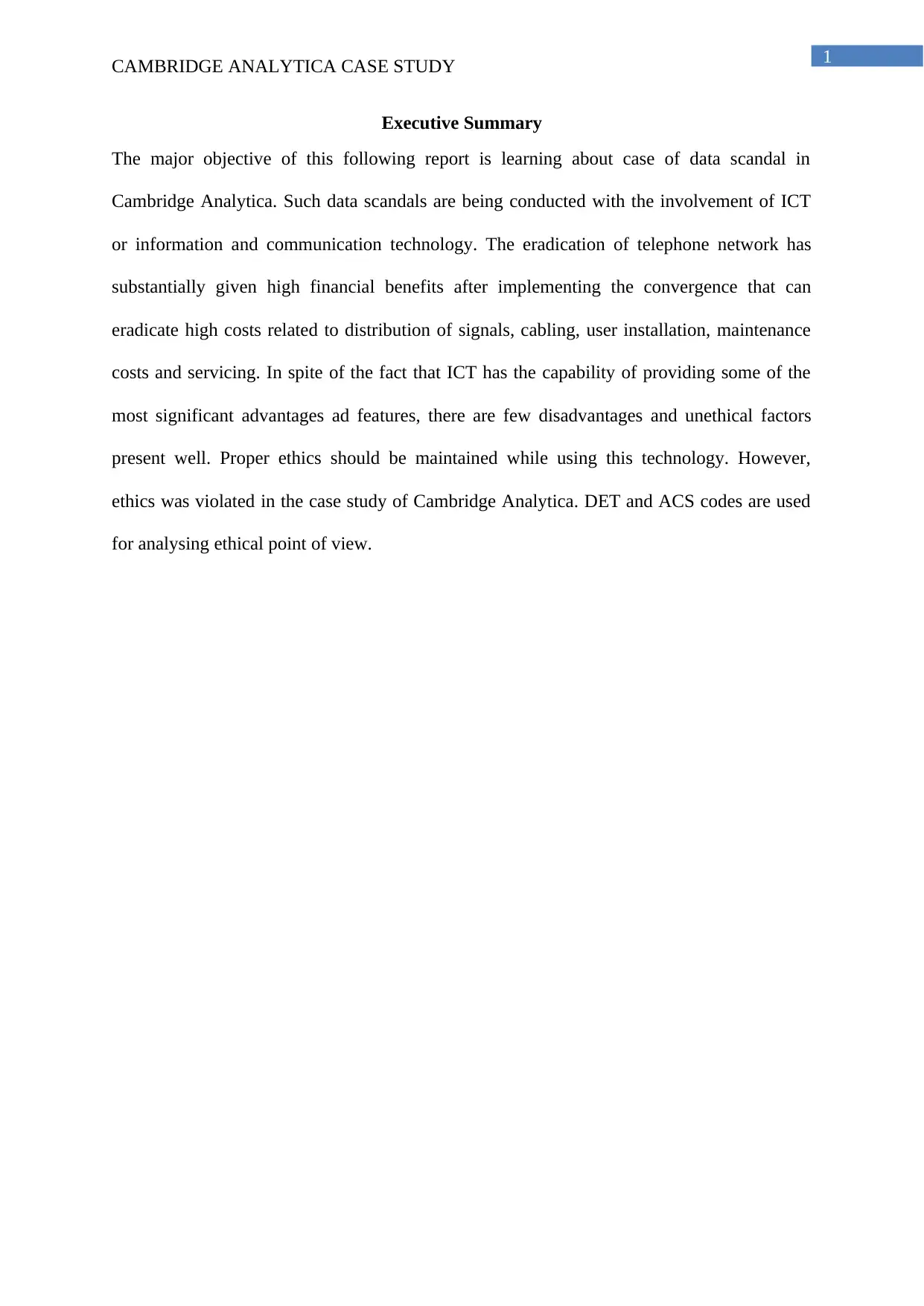
1
CAMBRIDGE ANALYTICA CASE STUDY
Executive Summary
The major objective of this following report is learning about case of data scandal in
Cambridge Analytica. Such data scandals are being conducted with the involvement of ICT
or information and communication technology. The eradication of telephone network has
substantially given high financial benefits after implementing the convergence that can
eradicate high costs related to distribution of signals, cabling, user installation, maintenance
costs and servicing. In spite of the fact that ICT has the capability of providing some of the
most significant advantages ad features, there are few disadvantages and unethical factors
present well. Proper ethics should be maintained while using this technology. However,
ethics was violated in the case study of Cambridge Analytica. DET and ACS codes are used
for analysing ethical point of view.
CAMBRIDGE ANALYTICA CASE STUDY
Executive Summary
The major objective of this following report is learning about case of data scandal in
Cambridge Analytica. Such data scandals are being conducted with the involvement of ICT
or information and communication technology. The eradication of telephone network has
substantially given high financial benefits after implementing the convergence that can
eradicate high costs related to distribution of signals, cabling, user installation, maintenance
costs and servicing. In spite of the fact that ICT has the capability of providing some of the
most significant advantages ad features, there are few disadvantages and unethical factors
present well. Proper ethics should be maintained while using this technology. However,
ethics was violated in the case study of Cambridge Analytica. DET and ACS codes are used
for analysing ethical point of view.
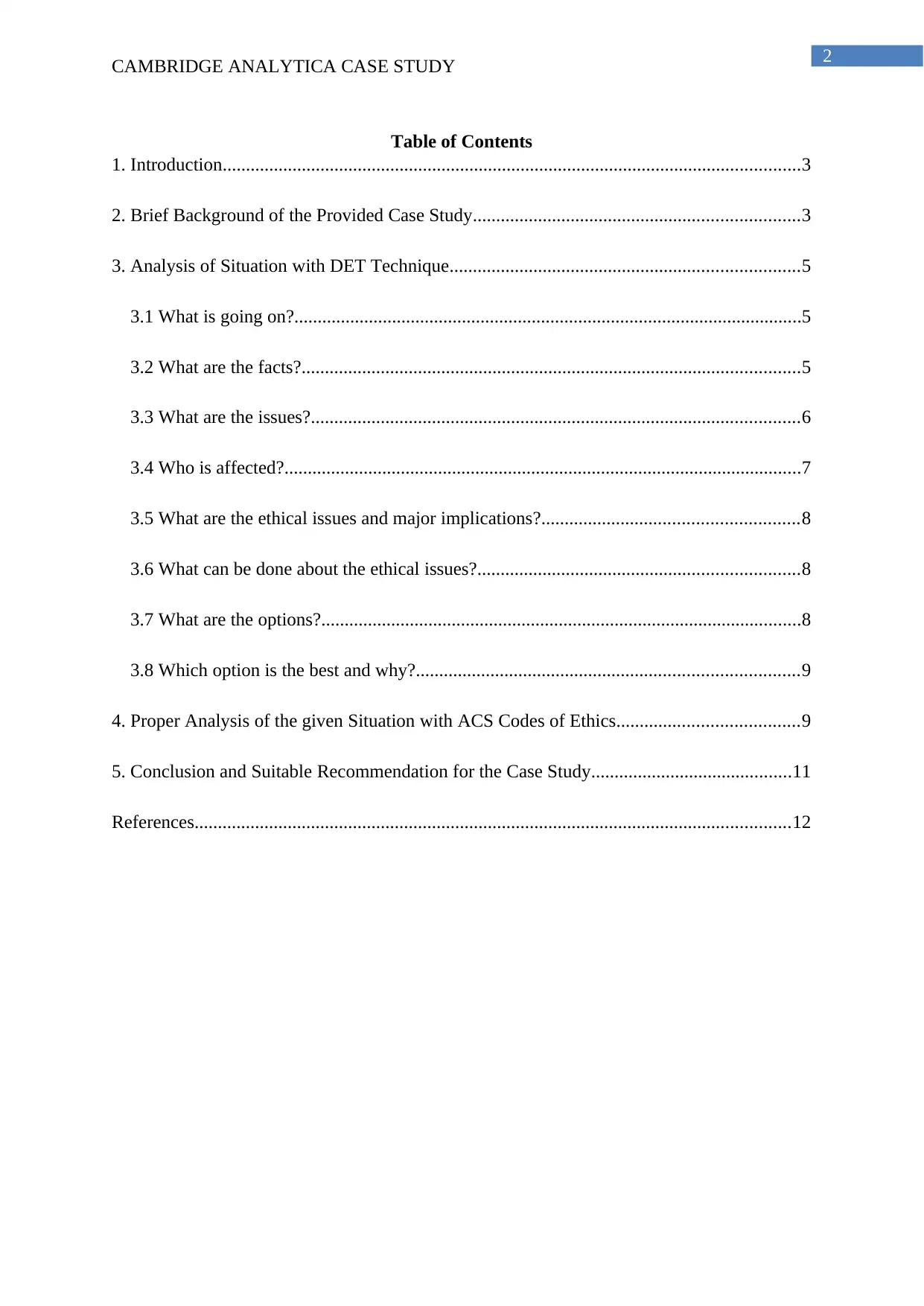
2
CAMBRIDGE ANALYTICA CASE STUDY
Table of Contents
1. Introduction............................................................................................................................3
2. Brief Background of the Provided Case Study......................................................................3
3. Analysis of Situation with DET Technique...........................................................................5
3.1 What is going on?.............................................................................................................5
3.2 What are the facts?...........................................................................................................5
3.3 What are the issues?.........................................................................................................6
3.4 Who is affected?...............................................................................................................7
3.5 What are the ethical issues and major implications?.......................................................8
3.6 What can be done about the ethical issues?.....................................................................8
3.7 What are the options?.......................................................................................................8
3.8 Which option is the best and why?..................................................................................9
4. Proper Analysis of the given Situation with ACS Codes of Ethics.......................................9
5. Conclusion and Suitable Recommendation for the Case Study...........................................11
References................................................................................................................................12
CAMBRIDGE ANALYTICA CASE STUDY
Table of Contents
1. Introduction............................................................................................................................3
2. Brief Background of the Provided Case Study......................................................................3
3. Analysis of Situation with DET Technique...........................................................................5
3.1 What is going on?.............................................................................................................5
3.2 What are the facts?...........................................................................................................5
3.3 What are the issues?.........................................................................................................6
3.4 Who is affected?...............................................................................................................7
3.5 What are the ethical issues and major implications?.......................................................8
3.6 What can be done about the ethical issues?.....................................................................8
3.7 What are the options?.......................................................................................................8
3.8 Which option is the best and why?..................................................................................9
4. Proper Analysis of the given Situation with ACS Codes of Ethics.......................................9
5. Conclusion and Suitable Recommendation for the Case Study...........................................11
References................................................................................................................................12
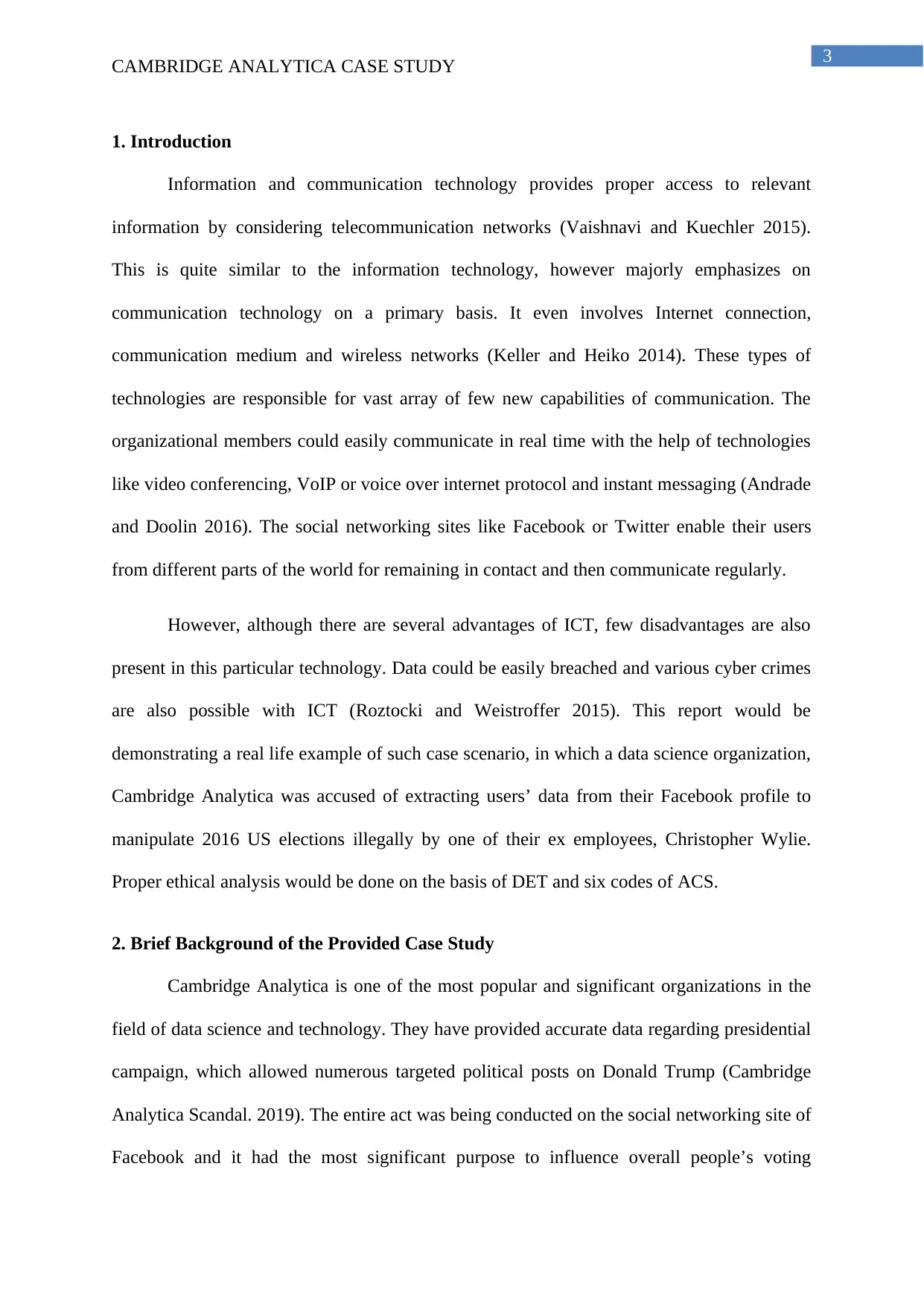
3
CAMBRIDGE ANALYTICA CASE STUDY
1. Introduction
Information and communication technology provides proper access to relevant
information by considering telecommunication networks (Vaishnavi and Kuechler 2015).
This is quite similar to the information technology, however majorly emphasizes on
communication technology on a primary basis. It even involves Internet connection,
communication medium and wireless networks (Keller and Heiko 2014). These types of
technologies are responsible for vast array of few new capabilities of communication. The
organizational members could easily communicate in real time with the help of technologies
like video conferencing, VoIP or voice over internet protocol and instant messaging (Andrade
and Doolin 2016). The social networking sites like Facebook or Twitter enable their users
from different parts of the world for remaining in contact and then communicate regularly.
However, although there are several advantages of ICT, few disadvantages are also
present in this particular technology. Data could be easily breached and various cyber crimes
are also possible with ICT (Roztocki and Weistroffer 2015). This report would be
demonstrating a real life example of such case scenario, in which a data science organization,
Cambridge Analytica was accused of extracting users’ data from their Facebook profile to
manipulate 2016 US elections illegally by one of their ex employees, Christopher Wylie.
Proper ethical analysis would be done on the basis of DET and six codes of ACS.
2. Brief Background of the Provided Case Study
Cambridge Analytica is one of the most popular and significant organizations in the
field of data science and technology. They have provided accurate data regarding presidential
campaign, which allowed numerous targeted political posts on Donald Trump (Cambridge
Analytica Scandal. 2019). The entire act was being conducted on the social networking site of
Facebook and it had the most significant purpose to influence overall people’s voting
CAMBRIDGE ANALYTICA CASE STUDY
1. Introduction
Information and communication technology provides proper access to relevant
information by considering telecommunication networks (Vaishnavi and Kuechler 2015).
This is quite similar to the information technology, however majorly emphasizes on
communication technology on a primary basis. It even involves Internet connection,
communication medium and wireless networks (Keller and Heiko 2014). These types of
technologies are responsible for vast array of few new capabilities of communication. The
organizational members could easily communicate in real time with the help of technologies
like video conferencing, VoIP or voice over internet protocol and instant messaging (Andrade
and Doolin 2016). The social networking sites like Facebook or Twitter enable their users
from different parts of the world for remaining in contact and then communicate regularly.
However, although there are several advantages of ICT, few disadvantages are also
present in this particular technology. Data could be easily breached and various cyber crimes
are also possible with ICT (Roztocki and Weistroffer 2015). This report would be
demonstrating a real life example of such case scenario, in which a data science organization,
Cambridge Analytica was accused of extracting users’ data from their Facebook profile to
manipulate 2016 US elections illegally by one of their ex employees, Christopher Wylie.
Proper ethical analysis would be done on the basis of DET and six codes of ACS.
2. Brief Background of the Provided Case Study
Cambridge Analytica is one of the most popular and significant organizations in the
field of data science and technology. They have provided accurate data regarding presidential
campaign, which allowed numerous targeted political posts on Donald Trump (Cambridge
Analytica Scandal. 2019). The entire act was being conducted on the social networking site of
Facebook and it had the most significant purpose to influence overall people’s voting
Secure Best Marks with AI Grader
Need help grading? Try our AI Grader for instant feedback on your assignments.
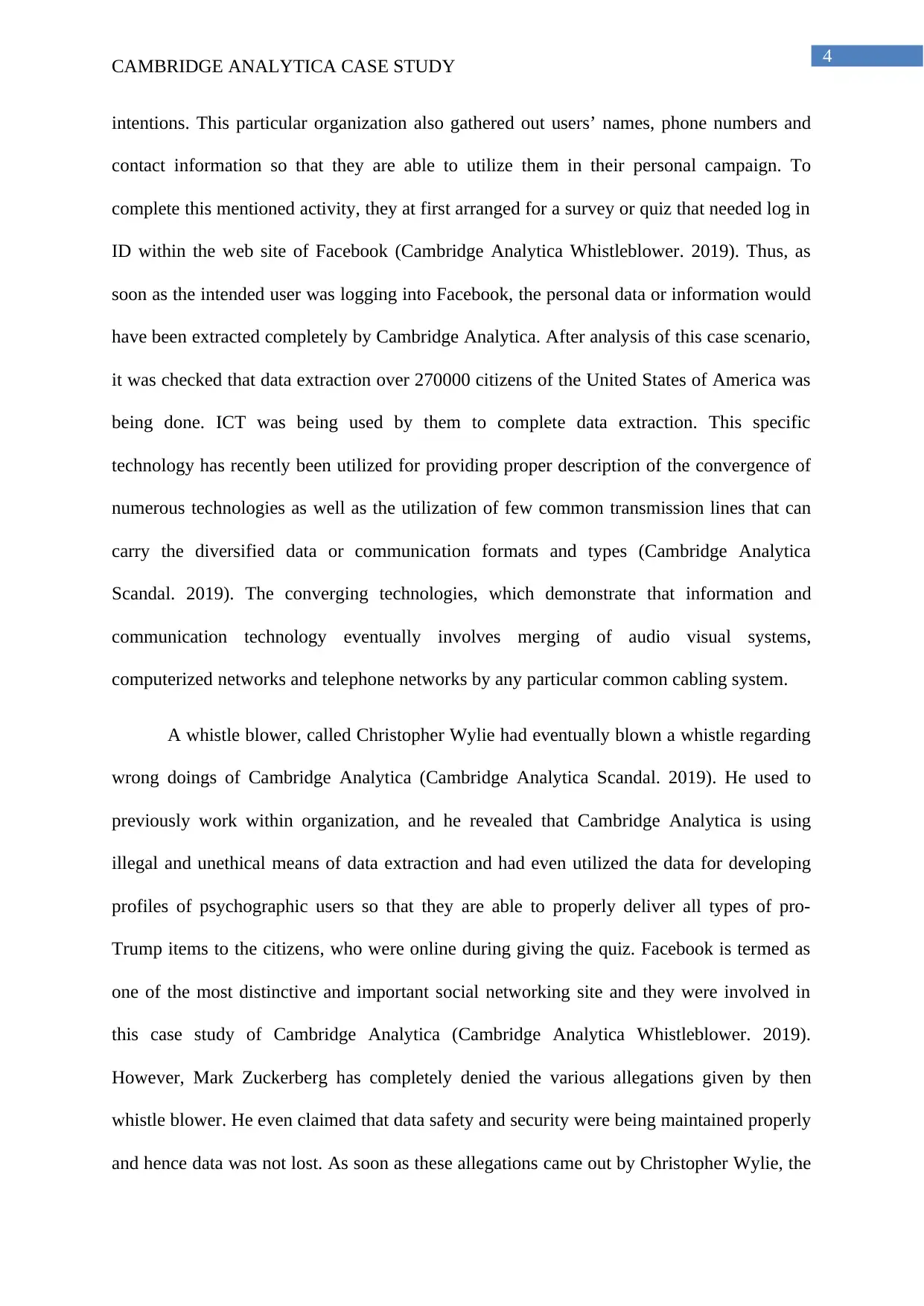
4
CAMBRIDGE ANALYTICA CASE STUDY
intentions. This particular organization also gathered out users’ names, phone numbers and
contact information so that they are able to utilize them in their personal campaign. To
complete this mentioned activity, they at first arranged for a survey or quiz that needed log in
ID within the web site of Facebook (Cambridge Analytica Whistleblower. 2019). Thus, as
soon as the intended user was logging into Facebook, the personal data or information would
have been extracted completely by Cambridge Analytica. After analysis of this case scenario,
it was checked that data extraction over 270000 citizens of the United States of America was
being done. ICT was being used by them to complete data extraction. This specific
technology has recently been utilized for providing proper description of the convergence of
numerous technologies as well as the utilization of few common transmission lines that can
carry the diversified data or communication formats and types (Cambridge Analytica
Scandal. 2019). The converging technologies, which demonstrate that information and
communication technology eventually involves merging of audio visual systems,
computerized networks and telephone networks by any particular common cabling system.
A whistle blower, called Christopher Wylie had eventually blown a whistle regarding
wrong doings of Cambridge Analytica (Cambridge Analytica Scandal. 2019). He used to
previously work within organization, and he revealed that Cambridge Analytica is using
illegal and unethical means of data extraction and had even utilized the data for developing
profiles of psychographic users so that they are able to properly deliver all types of pro-
Trump items to the citizens, who were online during giving the quiz. Facebook is termed as
one of the most distinctive and important social networking site and they were involved in
this case study of Cambridge Analytica (Cambridge Analytica Whistleblower. 2019).
However, Mark Zuckerberg has completely denied the various allegations given by then
whistle blower. He even claimed that data safety and security were being maintained properly
and hence data was not lost. As soon as these allegations came out by Christopher Wylie, the
CAMBRIDGE ANALYTICA CASE STUDY
intentions. This particular organization also gathered out users’ names, phone numbers and
contact information so that they are able to utilize them in their personal campaign. To
complete this mentioned activity, they at first arranged for a survey or quiz that needed log in
ID within the web site of Facebook (Cambridge Analytica Whistleblower. 2019). Thus, as
soon as the intended user was logging into Facebook, the personal data or information would
have been extracted completely by Cambridge Analytica. After analysis of this case scenario,
it was checked that data extraction over 270000 citizens of the United States of America was
being done. ICT was being used by them to complete data extraction. This specific
technology has recently been utilized for providing proper description of the convergence of
numerous technologies as well as the utilization of few common transmission lines that can
carry the diversified data or communication formats and types (Cambridge Analytica
Scandal. 2019). The converging technologies, which demonstrate that information and
communication technology eventually involves merging of audio visual systems,
computerized networks and telephone networks by any particular common cabling system.
A whistle blower, called Christopher Wylie had eventually blown a whistle regarding
wrong doings of Cambridge Analytica (Cambridge Analytica Scandal. 2019). He used to
previously work within organization, and he revealed that Cambridge Analytica is using
illegal and unethical means of data extraction and had even utilized the data for developing
profiles of psychographic users so that they are able to properly deliver all types of pro-
Trump items to the citizens, who were online during giving the quiz. Facebook is termed as
one of the most distinctive and important social networking site and they were involved in
this case study of Cambridge Analytica (Cambridge Analytica Whistleblower. 2019).
However, Mark Zuckerberg has completely denied the various allegations given by then
whistle blower. He even claimed that data safety and security were being maintained properly
and hence data was not lost. As soon as these allegations came out by Christopher Wylie, the
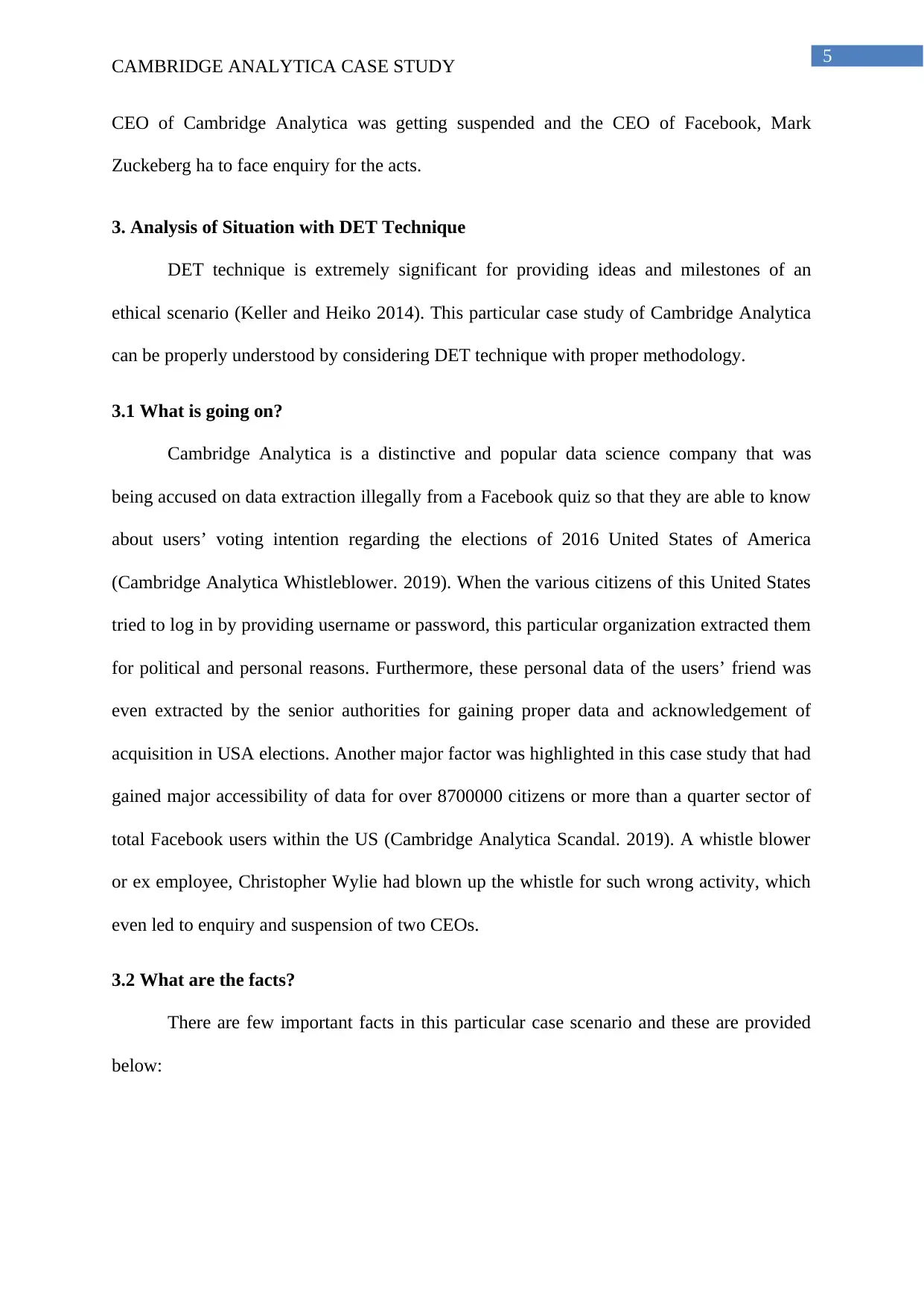
5
CAMBRIDGE ANALYTICA CASE STUDY
CEO of Cambridge Analytica was getting suspended and the CEO of Facebook, Mark
Zuckeberg ha to face enquiry for the acts.
3. Analysis of Situation with DET Technique
DET technique is extremely significant for providing ideas and milestones of an
ethical scenario (Keller and Heiko 2014). This particular case study of Cambridge Analytica
can be properly understood by considering DET technique with proper methodology.
3.1 What is going on?
Cambridge Analytica is a distinctive and popular data science company that was
being accused on data extraction illegally from a Facebook quiz so that they are able to know
about users’ voting intention regarding the elections of 2016 United States of America
(Cambridge Analytica Whistleblower. 2019). When the various citizens of this United States
tried to log in by providing username or password, this particular organization extracted them
for political and personal reasons. Furthermore, these personal data of the users’ friend was
even extracted by the senior authorities for gaining proper data and acknowledgement of
acquisition in USA elections. Another major factor was highlighted in this case study that had
gained major accessibility of data for over 8700000 citizens or more than a quarter sector of
total Facebook users within the US (Cambridge Analytica Scandal. 2019). A whistle blower
or ex employee, Christopher Wylie had blown up the whistle for such wrong activity, which
even led to enquiry and suspension of two CEOs.
3.2 What are the facts?
There are few important facts in this particular case scenario and these are provided
below:
CAMBRIDGE ANALYTICA CASE STUDY
CEO of Cambridge Analytica was getting suspended and the CEO of Facebook, Mark
Zuckeberg ha to face enquiry for the acts.
3. Analysis of Situation with DET Technique
DET technique is extremely significant for providing ideas and milestones of an
ethical scenario (Keller and Heiko 2014). This particular case study of Cambridge Analytica
can be properly understood by considering DET technique with proper methodology.
3.1 What is going on?
Cambridge Analytica is a distinctive and popular data science company that was
being accused on data extraction illegally from a Facebook quiz so that they are able to know
about users’ voting intention regarding the elections of 2016 United States of America
(Cambridge Analytica Whistleblower. 2019). When the various citizens of this United States
tried to log in by providing username or password, this particular organization extracted them
for political and personal reasons. Furthermore, these personal data of the users’ friend was
even extracted by the senior authorities for gaining proper data and acknowledgement of
acquisition in USA elections. Another major factor was highlighted in this case study that had
gained major accessibility of data for over 8700000 citizens or more than a quarter sector of
total Facebook users within the US (Cambridge Analytica Scandal. 2019). A whistle blower
or ex employee, Christopher Wylie had blown up the whistle for such wrong activity, which
even led to enquiry and suspension of two CEOs.
3.2 What are the facts?
There are few important facts in this particular case scenario and these are provided
below:
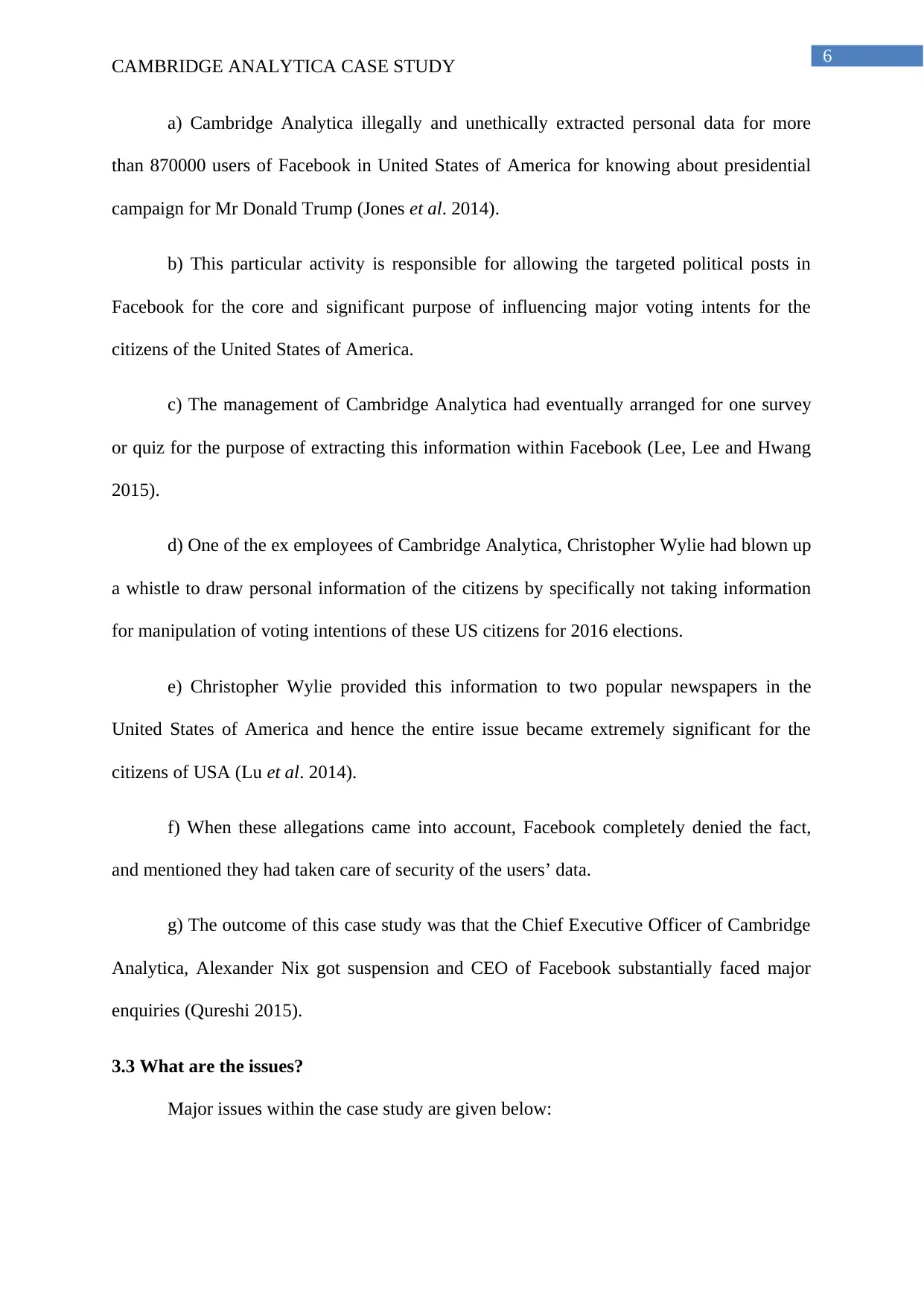
6
CAMBRIDGE ANALYTICA CASE STUDY
a) Cambridge Analytica illegally and unethically extracted personal data for more
than 870000 users of Facebook in United States of America for knowing about presidential
campaign for Mr Donald Trump (Jones et al. 2014).
b) This particular activity is responsible for allowing the targeted political posts in
Facebook for the core and significant purpose of influencing major voting intents for the
citizens of the United States of America.
c) The management of Cambridge Analytica had eventually arranged for one survey
or quiz for the purpose of extracting this information within Facebook (Lee, Lee and Hwang
2015).
d) One of the ex employees of Cambridge Analytica, Christopher Wylie had blown up
a whistle to draw personal information of the citizens by specifically not taking information
for manipulation of voting intentions of these US citizens for 2016 elections.
e) Christopher Wylie provided this information to two popular newspapers in the
United States of America and hence the entire issue became extremely significant for the
citizens of USA (Lu et al. 2014).
f) When these allegations came into account, Facebook completely denied the fact,
and mentioned they had taken care of security of the users’ data.
g) The outcome of this case study was that the Chief Executive Officer of Cambridge
Analytica, Alexander Nix got suspension and CEO of Facebook substantially faced major
enquiries (Qureshi 2015).
3.3 What are the issues?
Major issues within the case study are given below:
CAMBRIDGE ANALYTICA CASE STUDY
a) Cambridge Analytica illegally and unethically extracted personal data for more
than 870000 users of Facebook in United States of America for knowing about presidential
campaign for Mr Donald Trump (Jones et al. 2014).
b) This particular activity is responsible for allowing the targeted political posts in
Facebook for the core and significant purpose of influencing major voting intents for the
citizens of the United States of America.
c) The management of Cambridge Analytica had eventually arranged for one survey
or quiz for the purpose of extracting this information within Facebook (Lee, Lee and Hwang
2015).
d) One of the ex employees of Cambridge Analytica, Christopher Wylie had blown up
a whistle to draw personal information of the citizens by specifically not taking information
for manipulation of voting intentions of these US citizens for 2016 elections.
e) Christopher Wylie provided this information to two popular newspapers in the
United States of America and hence the entire issue became extremely significant for the
citizens of USA (Lu et al. 2014).
f) When these allegations came into account, Facebook completely denied the fact,
and mentioned they had taken care of security of the users’ data.
g) The outcome of this case study was that the Chief Executive Officer of Cambridge
Analytica, Alexander Nix got suspension and CEO of Facebook substantially faced major
enquiries (Qureshi 2015).
3.3 What are the issues?
Major issues within the case study are given below:
Paraphrase This Document
Need a fresh take? Get an instant paraphrase of this document with our AI Paraphraser
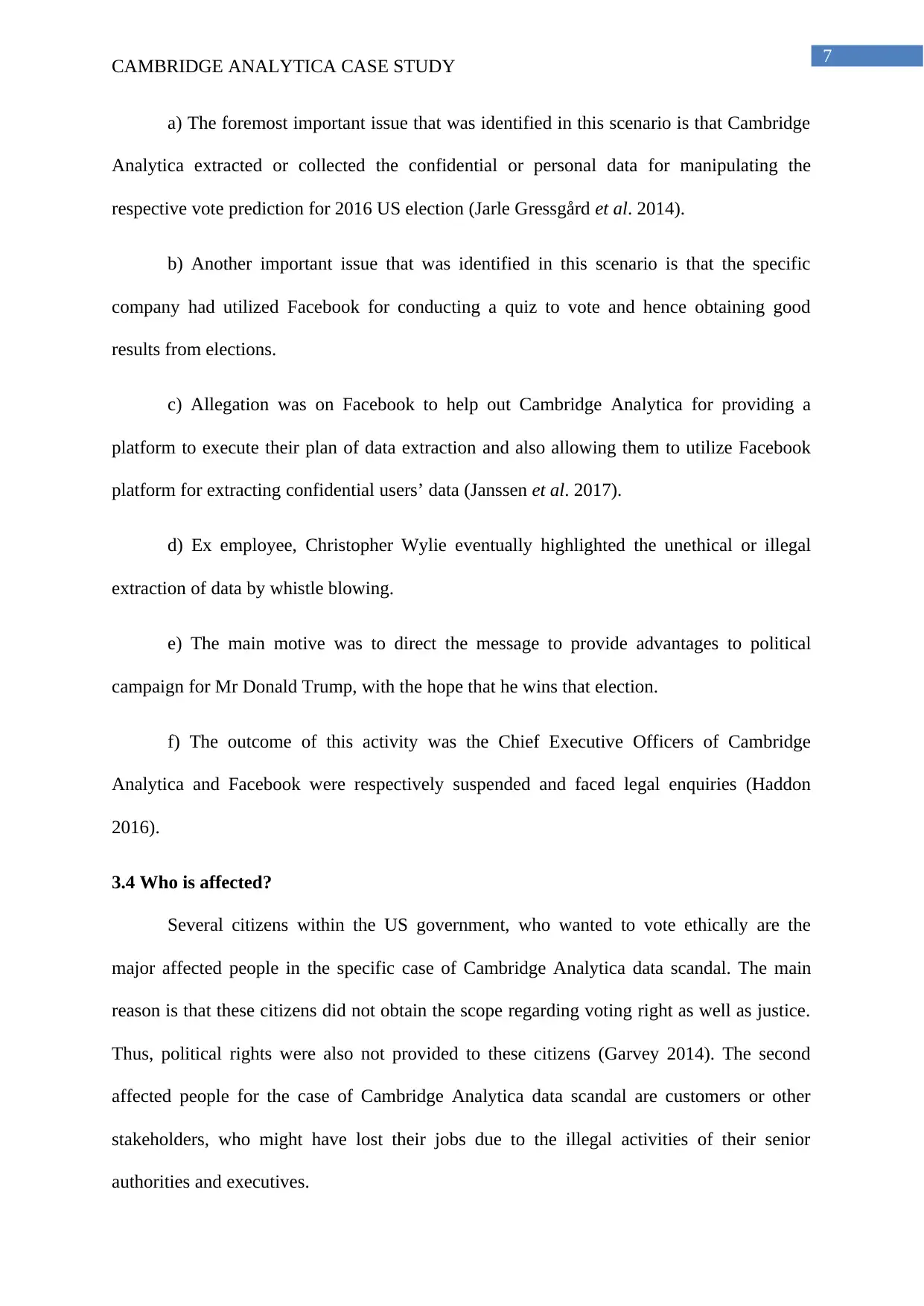
7
CAMBRIDGE ANALYTICA CASE STUDY
a) The foremost important issue that was identified in this scenario is that Cambridge
Analytica extracted or collected the confidential or personal data for manipulating the
respective vote prediction for 2016 US election (Jarle Gressgård et al. 2014).
b) Another important issue that was identified in this scenario is that the specific
company had utilized Facebook for conducting a quiz to vote and hence obtaining good
results from elections.
c) Allegation was on Facebook to help out Cambridge Analytica for providing a
platform to execute their plan of data extraction and also allowing them to utilize Facebook
platform for extracting confidential users’ data (Janssen et al. 2017).
d) Ex employee, Christopher Wylie eventually highlighted the unethical or illegal
extraction of data by whistle blowing.
e) The main motive was to direct the message to provide advantages to political
campaign for Mr Donald Trump, with the hope that he wins that election.
f) The outcome of this activity was the Chief Executive Officers of Cambridge
Analytica and Facebook were respectively suspended and faced legal enquiries (Haddon
2016).
3.4 Who is affected?
Several citizens within the US government, who wanted to vote ethically are the
major affected people in the specific case of Cambridge Analytica data scandal. The main
reason is that these citizens did not obtain the scope regarding voting right as well as justice.
Thus, political rights were also not provided to these citizens (Garvey 2014). The second
affected people for the case of Cambridge Analytica data scandal are customers or other
stakeholders, who might have lost their jobs due to the illegal activities of their senior
authorities and executives.
CAMBRIDGE ANALYTICA CASE STUDY
a) The foremost important issue that was identified in this scenario is that Cambridge
Analytica extracted or collected the confidential or personal data for manipulating the
respective vote prediction for 2016 US election (Jarle Gressgård et al. 2014).
b) Another important issue that was identified in this scenario is that the specific
company had utilized Facebook for conducting a quiz to vote and hence obtaining good
results from elections.
c) Allegation was on Facebook to help out Cambridge Analytica for providing a
platform to execute their plan of data extraction and also allowing them to utilize Facebook
platform for extracting confidential users’ data (Janssen et al. 2017).
d) Ex employee, Christopher Wylie eventually highlighted the unethical or illegal
extraction of data by whistle blowing.
e) The main motive was to direct the message to provide advantages to political
campaign for Mr Donald Trump, with the hope that he wins that election.
f) The outcome of this activity was the Chief Executive Officers of Cambridge
Analytica and Facebook were respectively suspended and faced legal enquiries (Haddon
2016).
3.4 Who is affected?
Several citizens within the US government, who wanted to vote ethically are the
major affected people in the specific case of Cambridge Analytica data scandal. The main
reason is that these citizens did not obtain the scope regarding voting right as well as justice.
Thus, political rights were also not provided to these citizens (Garvey 2014). The second
affected people for the case of Cambridge Analytica data scandal are customers or other
stakeholders, who might have lost their jobs due to the illegal activities of their senior
authorities and executives.
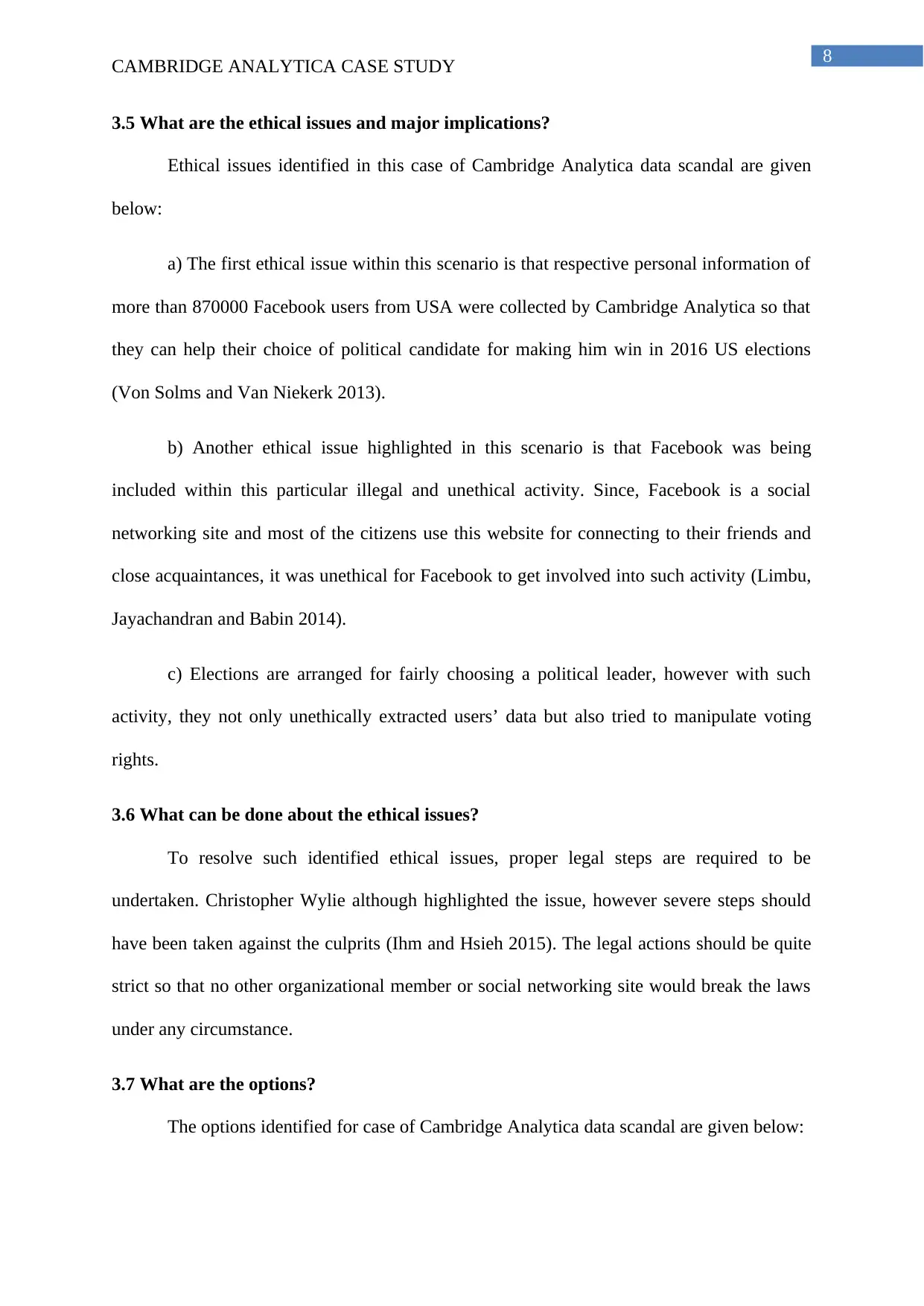
8
CAMBRIDGE ANALYTICA CASE STUDY
3.5 What are the ethical issues and major implications?
Ethical issues identified in this case of Cambridge Analytica data scandal are given
below:
a) The first ethical issue within this scenario is that respective personal information of
more than 870000 Facebook users from USA were collected by Cambridge Analytica so that
they can help their choice of political candidate for making him win in 2016 US elections
(Von Solms and Van Niekerk 2013).
b) Another ethical issue highlighted in this scenario is that Facebook was being
included within this particular illegal and unethical activity. Since, Facebook is a social
networking site and most of the citizens use this website for connecting to their friends and
close acquaintances, it was unethical for Facebook to get involved into such activity (Limbu,
Jayachandran and Babin 2014).
c) Elections are arranged for fairly choosing a political leader, however with such
activity, they not only unethically extracted users’ data but also tried to manipulate voting
rights.
3.6 What can be done about the ethical issues?
To resolve such identified ethical issues, proper legal steps are required to be
undertaken. Christopher Wylie although highlighted the issue, however severe steps should
have been taken against the culprits (Ihm and Hsieh 2015). The legal actions should be quite
strict so that no other organizational member or social networking site would break the laws
under any circumstance.
3.7 What are the options?
The options identified for case of Cambridge Analytica data scandal are given below:
CAMBRIDGE ANALYTICA CASE STUDY
3.5 What are the ethical issues and major implications?
Ethical issues identified in this case of Cambridge Analytica data scandal are given
below:
a) The first ethical issue within this scenario is that respective personal information of
more than 870000 Facebook users from USA were collected by Cambridge Analytica so that
they can help their choice of political candidate for making him win in 2016 US elections
(Von Solms and Van Niekerk 2013).
b) Another ethical issue highlighted in this scenario is that Facebook was being
included within this particular illegal and unethical activity. Since, Facebook is a social
networking site and most of the citizens use this website for connecting to their friends and
close acquaintances, it was unethical for Facebook to get involved into such activity (Limbu,
Jayachandran and Babin 2014).
c) Elections are arranged for fairly choosing a political leader, however with such
activity, they not only unethically extracted users’ data but also tried to manipulate voting
rights.
3.6 What can be done about the ethical issues?
To resolve such identified ethical issues, proper legal steps are required to be
undertaken. Christopher Wylie although highlighted the issue, however severe steps should
have been taken against the culprits (Ihm and Hsieh 2015). The legal actions should be quite
strict so that no other organizational member or social networking site would break the laws
under any circumstance.
3.7 What are the options?
The options identified for case of Cambridge Analytica data scandal are given below:
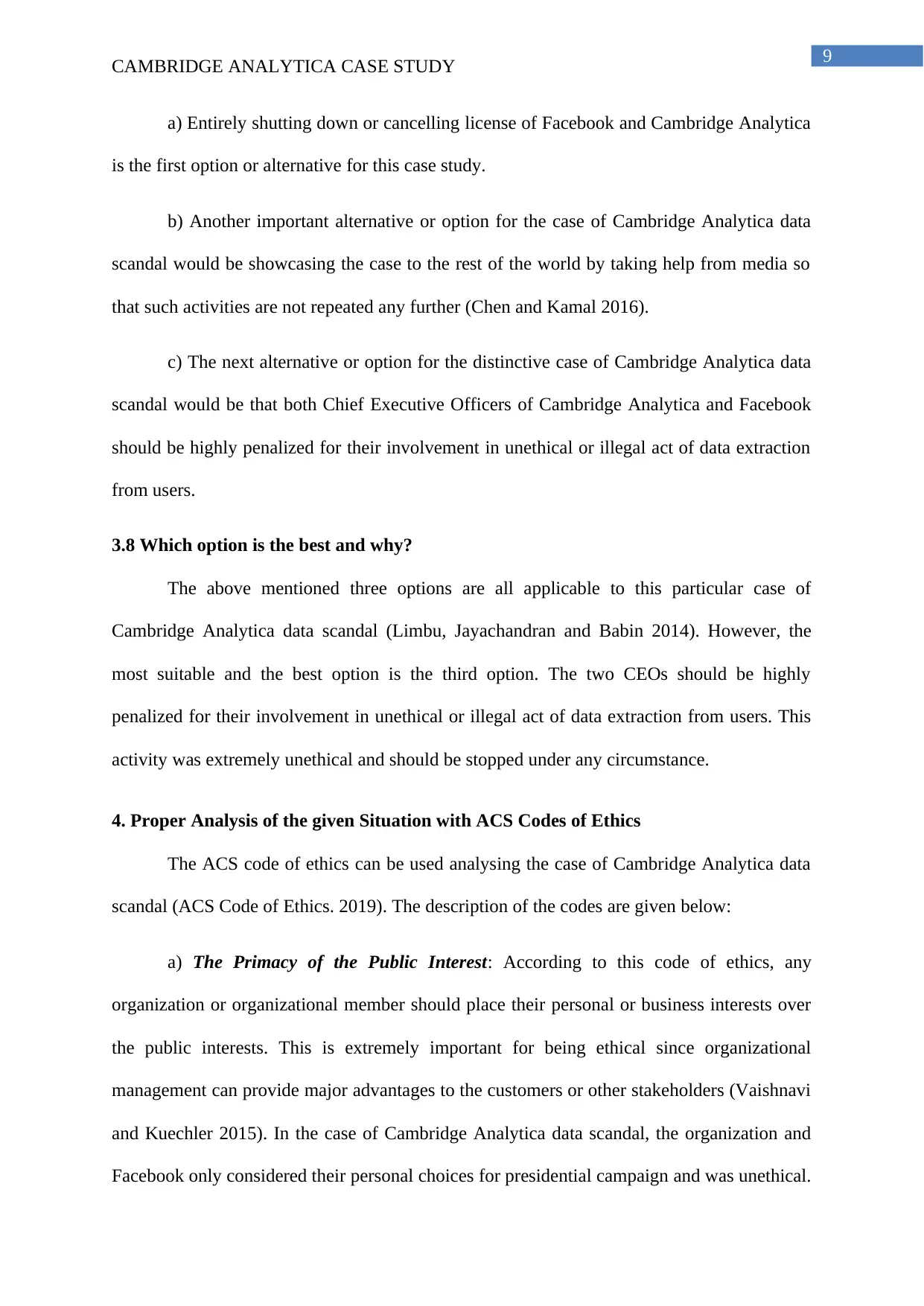
9
CAMBRIDGE ANALYTICA CASE STUDY
a) Entirely shutting down or cancelling license of Facebook and Cambridge Analytica
is the first option or alternative for this case study.
b) Another important alternative or option for the case of Cambridge Analytica data
scandal would be showcasing the case to the rest of the world by taking help from media so
that such activities are not repeated any further (Chen and Kamal 2016).
c) The next alternative or option for the distinctive case of Cambridge Analytica data
scandal would be that both Chief Executive Officers of Cambridge Analytica and Facebook
should be highly penalized for their involvement in unethical or illegal act of data extraction
from users.
3.8 Which option is the best and why?
The above mentioned three options are all applicable to this particular case of
Cambridge Analytica data scandal (Limbu, Jayachandran and Babin 2014). However, the
most suitable and the best option is the third option. The two CEOs should be highly
penalized for their involvement in unethical or illegal act of data extraction from users. This
activity was extremely unethical and should be stopped under any circumstance.
4. Proper Analysis of the given Situation with ACS Codes of Ethics
The ACS code of ethics can be used analysing the case of Cambridge Analytica data
scandal (ACS Code of Ethics. 2019). The description of the codes are given below:
a) The Primacy of the Public Interest: According to this code of ethics, any
organization or organizational member should place their personal or business interests over
the public interests. This is extremely important for being ethical since organizational
management can provide major advantages to the customers or other stakeholders (Vaishnavi
and Kuechler 2015). In the case of Cambridge Analytica data scandal, the organization and
Facebook only considered their personal choices for presidential campaign and was unethical.
CAMBRIDGE ANALYTICA CASE STUDY
a) Entirely shutting down or cancelling license of Facebook and Cambridge Analytica
is the first option or alternative for this case study.
b) Another important alternative or option for the case of Cambridge Analytica data
scandal would be showcasing the case to the rest of the world by taking help from media so
that such activities are not repeated any further (Chen and Kamal 2016).
c) The next alternative or option for the distinctive case of Cambridge Analytica data
scandal would be that both Chief Executive Officers of Cambridge Analytica and Facebook
should be highly penalized for their involvement in unethical or illegal act of data extraction
from users.
3.8 Which option is the best and why?
The above mentioned three options are all applicable to this particular case of
Cambridge Analytica data scandal (Limbu, Jayachandran and Babin 2014). However, the
most suitable and the best option is the third option. The two CEOs should be highly
penalized for their involvement in unethical or illegal act of data extraction from users. This
activity was extremely unethical and should be stopped under any circumstance.
4. Proper Analysis of the given Situation with ACS Codes of Ethics
The ACS code of ethics can be used analysing the case of Cambridge Analytica data
scandal (ACS Code of Ethics. 2019). The description of the codes are given below:
a) The Primacy of the Public Interest: According to this code of ethics, any
organization or organizational member should place their personal or business interests over
the public interests. This is extremely important for being ethical since organizational
management can provide major advantages to the customers or other stakeholders (Vaishnavi
and Kuechler 2015). In the case of Cambridge Analytica data scandal, the organization and
Facebook only considered their personal choices for presidential campaign and was unethical.
Secure Best Marks with AI Grader
Need help grading? Try our AI Grader for instant feedback on your assignments.
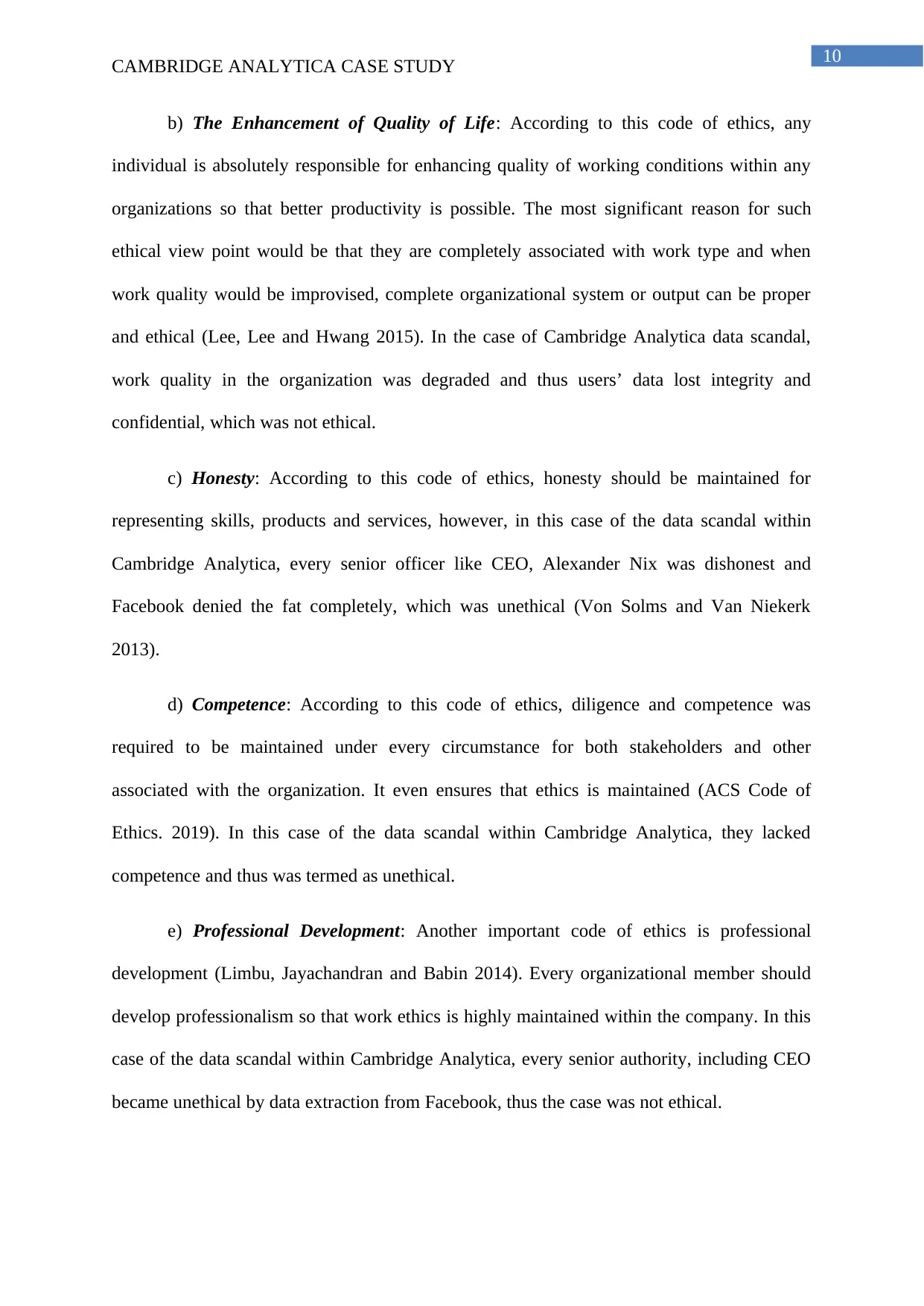
10
CAMBRIDGE ANALYTICA CASE STUDY
b) The Enhancement of Quality of Life: According to this code of ethics, any
individual is absolutely responsible for enhancing quality of working conditions within any
organizations so that better productivity is possible. The most significant reason for such
ethical view point would be that they are completely associated with work type and when
work quality would be improvised, complete organizational system or output can be proper
and ethical (Lee, Lee and Hwang 2015). In the case of Cambridge Analytica data scandal,
work quality in the organization was degraded and thus users’ data lost integrity and
confidential, which was not ethical.
c) Honesty: According to this code of ethics, honesty should be maintained for
representing skills, products and services, however, in this case of the data scandal within
Cambridge Analytica, every senior officer like CEO, Alexander Nix was dishonest and
Facebook denied the fat completely, which was unethical (Von Solms and Van Niekerk
2013).
d) Competence: According to this code of ethics, diligence and competence was
required to be maintained under every circumstance for both stakeholders and other
associated with the organization. It even ensures that ethics is maintained (ACS Code of
Ethics. 2019). In this case of the data scandal within Cambridge Analytica, they lacked
competence and thus was termed as unethical.
e) Professional Development: Another important code of ethics is professional
development (Limbu, Jayachandran and Babin 2014). Every organizational member should
develop professionalism so that work ethics is highly maintained within the company. In this
case of the data scandal within Cambridge Analytica, every senior authority, including CEO
became unethical by data extraction from Facebook, thus the case was not ethical.
CAMBRIDGE ANALYTICA CASE STUDY
b) The Enhancement of Quality of Life: According to this code of ethics, any
individual is absolutely responsible for enhancing quality of working conditions within any
organizations so that better productivity is possible. The most significant reason for such
ethical view point would be that they are completely associated with work type and when
work quality would be improvised, complete organizational system or output can be proper
and ethical (Lee, Lee and Hwang 2015). In the case of Cambridge Analytica data scandal,
work quality in the organization was degraded and thus users’ data lost integrity and
confidential, which was not ethical.
c) Honesty: According to this code of ethics, honesty should be maintained for
representing skills, products and services, however, in this case of the data scandal within
Cambridge Analytica, every senior officer like CEO, Alexander Nix was dishonest and
Facebook denied the fat completely, which was unethical (Von Solms and Van Niekerk
2013).
d) Competence: According to this code of ethics, diligence and competence was
required to be maintained under every circumstance for both stakeholders and other
associated with the organization. It even ensures that ethics is maintained (ACS Code of
Ethics. 2019). In this case of the data scandal within Cambridge Analytica, they lacked
competence and thus was termed as unethical.
e) Professional Development: Another important code of ethics is professional
development (Limbu, Jayachandran and Babin 2014). Every organizational member should
develop professionalism so that work ethics is highly maintained within the company. In this
case of the data scandal within Cambridge Analytica, every senior authority, including CEO
became unethical by data extraction from Facebook, thus the case was not ethical.
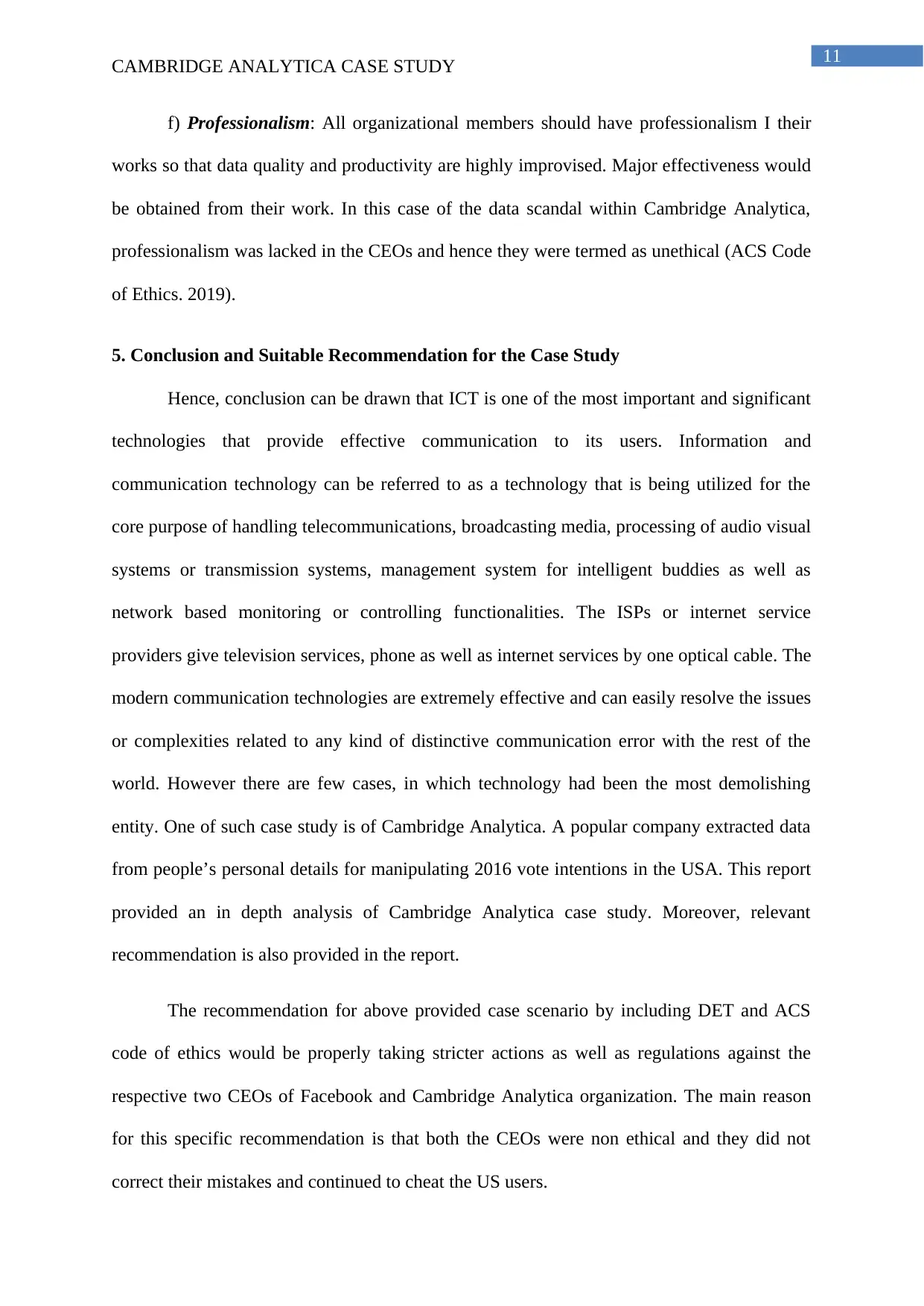
11
CAMBRIDGE ANALYTICA CASE STUDY
f) Professionalism: All organizational members should have professionalism I their
works so that data quality and productivity are highly improvised. Major effectiveness would
be obtained from their work. In this case of the data scandal within Cambridge Analytica,
professionalism was lacked in the CEOs and hence they were termed as unethical (ACS Code
of Ethics. 2019).
5. Conclusion and Suitable Recommendation for the Case Study
Hence, conclusion can be drawn that ICT is one of the most important and significant
technologies that provide effective communication to its users. Information and
communication technology can be referred to as a technology that is being utilized for the
core purpose of handling telecommunications, broadcasting media, processing of audio visual
systems or transmission systems, management system for intelligent buddies as well as
network based monitoring or controlling functionalities. The ISPs or internet service
providers give television services, phone as well as internet services by one optical cable. The
modern communication technologies are extremely effective and can easily resolve the issues
or complexities related to any kind of distinctive communication error with the rest of the
world. However there are few cases, in which technology had been the most demolishing
entity. One of such case study is of Cambridge Analytica. A popular company extracted data
from people’s personal details for manipulating 2016 vote intentions in the USA. This report
provided an in depth analysis of Cambridge Analytica case study. Moreover, relevant
recommendation is also provided in the report.
The recommendation for above provided case scenario by including DET and ACS
code of ethics would be properly taking stricter actions as well as regulations against the
respective two CEOs of Facebook and Cambridge Analytica organization. The main reason
for this specific recommendation is that both the CEOs were non ethical and they did not
correct their mistakes and continued to cheat the US users.
CAMBRIDGE ANALYTICA CASE STUDY
f) Professionalism: All organizational members should have professionalism I their
works so that data quality and productivity are highly improvised. Major effectiveness would
be obtained from their work. In this case of the data scandal within Cambridge Analytica,
professionalism was lacked in the CEOs and hence they were termed as unethical (ACS Code
of Ethics. 2019).
5. Conclusion and Suitable Recommendation for the Case Study
Hence, conclusion can be drawn that ICT is one of the most important and significant
technologies that provide effective communication to its users. Information and
communication technology can be referred to as a technology that is being utilized for the
core purpose of handling telecommunications, broadcasting media, processing of audio visual
systems or transmission systems, management system for intelligent buddies as well as
network based monitoring or controlling functionalities. The ISPs or internet service
providers give television services, phone as well as internet services by one optical cable. The
modern communication technologies are extremely effective and can easily resolve the issues
or complexities related to any kind of distinctive communication error with the rest of the
world. However there are few cases, in which technology had been the most demolishing
entity. One of such case study is of Cambridge Analytica. A popular company extracted data
from people’s personal details for manipulating 2016 vote intentions in the USA. This report
provided an in depth analysis of Cambridge Analytica case study. Moreover, relevant
recommendation is also provided in the report.
The recommendation for above provided case scenario by including DET and ACS
code of ethics would be properly taking stricter actions as well as regulations against the
respective two CEOs of Facebook and Cambridge Analytica organization. The main reason
for this specific recommendation is that both the CEOs were non ethical and they did not
correct their mistakes and continued to cheat the US users.
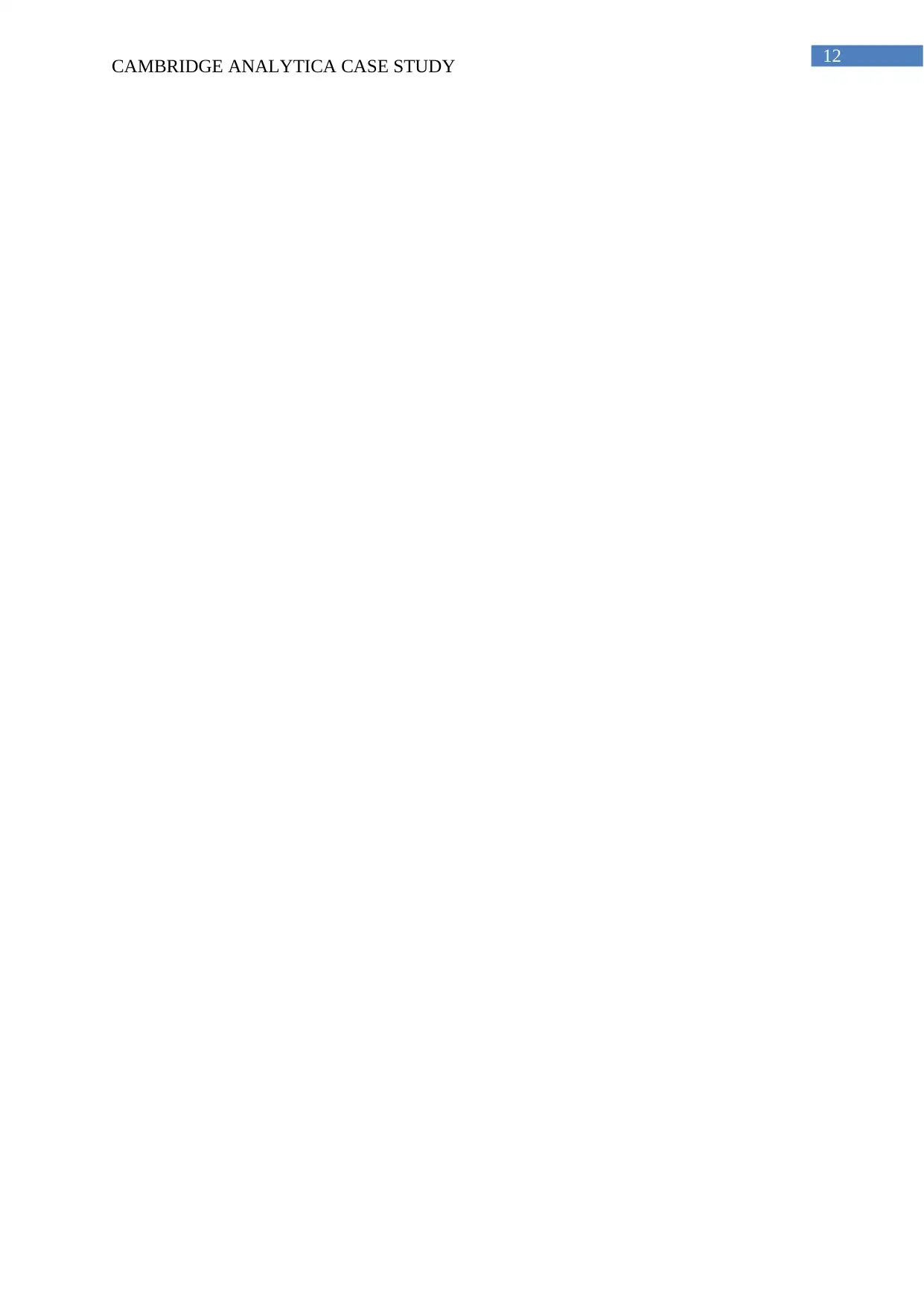
12
CAMBRIDGE ANALYTICA CASE STUDY
CAMBRIDGE ANALYTICA CASE STUDY
Paraphrase This Document
Need a fresh take? Get an instant paraphrase of this document with our AI Paraphraser
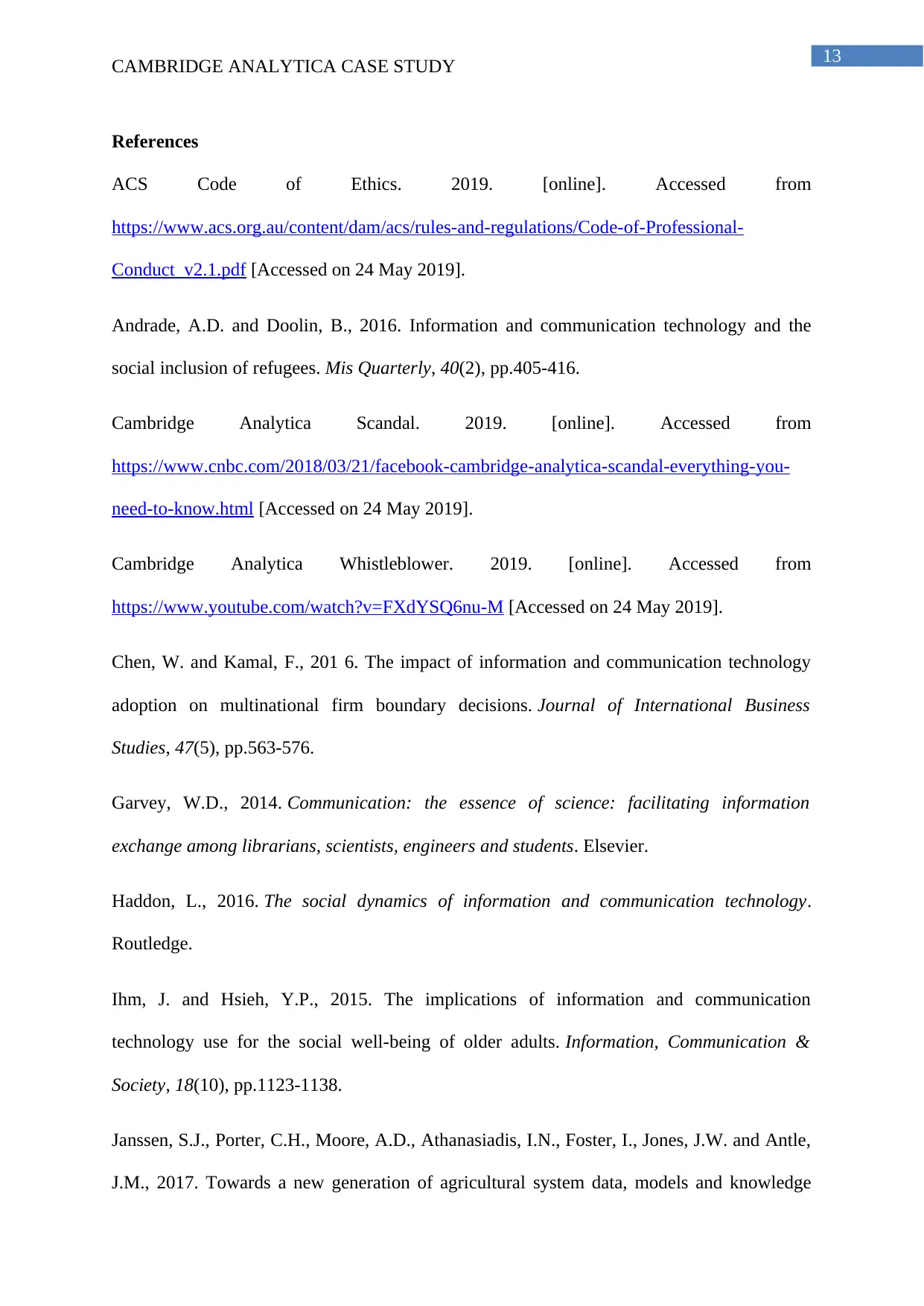
13
CAMBRIDGE ANALYTICA CASE STUDY
References
ACS Code of Ethics. 2019. [online]. Accessed from
https://www.acs.org.au/content/dam/acs/rules-and-regulations/Code-of-Professional-
Conduct_v2.1.pdf [Accessed on 24 May 2019].
Andrade, A.D. and Doolin, B., 2016. Information and communication technology and the
social inclusion of refugees. Mis Quarterly, 40(2), pp.405-416.
Cambridge Analytica Scandal. 2019. [online]. Accessed from
https://www.cnbc.com/2018/03/21/facebook-cambridge-analytica-scandal-everything-you-
need-to-know.html [Accessed on 24 May 2019].
Cambridge Analytica Whistleblower. 2019. [online]. Accessed from
https://www.youtube.com/watch?v=FXdYSQ6nu-M [Accessed on 24 May 2019].
Chen, W. and Kamal, F., 201 6. The impact of information and communication technology
adoption on multinational firm boundary decisions. Journal of International Business
Studies, 47(5), pp.563-576.
Garvey, W.D., 2014. Communication: the essence of science: facilitating information
exchange among librarians, scientists, engineers and students. Elsevier.
Haddon, L., 2016. The social dynamics of information and communication technology.
Routledge.
Ihm, J. and Hsieh, Y.P., 2015. The implications of information and communication
technology use for the social well-being of older adults. Information, Communication &
Society, 18(10), pp.1123-1138.
Janssen, S.J., Porter, C.H., Moore, A.D., Athanasiadis, I.N., Foster, I., Jones, J.W. and Antle,
J.M., 2017. Towards a new generation of agricultural system data, models and knowledge
CAMBRIDGE ANALYTICA CASE STUDY
References
ACS Code of Ethics. 2019. [online]. Accessed from
https://www.acs.org.au/content/dam/acs/rules-and-regulations/Code-of-Professional-
Conduct_v2.1.pdf [Accessed on 24 May 2019].
Andrade, A.D. and Doolin, B., 2016. Information and communication technology and the
social inclusion of refugees. Mis Quarterly, 40(2), pp.405-416.
Cambridge Analytica Scandal. 2019. [online]. Accessed from
https://www.cnbc.com/2018/03/21/facebook-cambridge-analytica-scandal-everything-you-
need-to-know.html [Accessed on 24 May 2019].
Cambridge Analytica Whistleblower. 2019. [online]. Accessed from
https://www.youtube.com/watch?v=FXdYSQ6nu-M [Accessed on 24 May 2019].
Chen, W. and Kamal, F., 201 6. The impact of information and communication technology
adoption on multinational firm boundary decisions. Journal of International Business
Studies, 47(5), pp.563-576.
Garvey, W.D., 2014. Communication: the essence of science: facilitating information
exchange among librarians, scientists, engineers and students. Elsevier.
Haddon, L., 2016. The social dynamics of information and communication technology.
Routledge.
Ihm, J. and Hsieh, Y.P., 2015. The implications of information and communication
technology use for the social well-being of older adults. Information, Communication &
Society, 18(10), pp.1123-1138.
Janssen, S.J., Porter, C.H., Moore, A.D., Athanasiadis, I.N., Foster, I., Jones, J.W. and Antle,
J.M., 2017. Towards a new generation of agricultural system data, models and knowledge
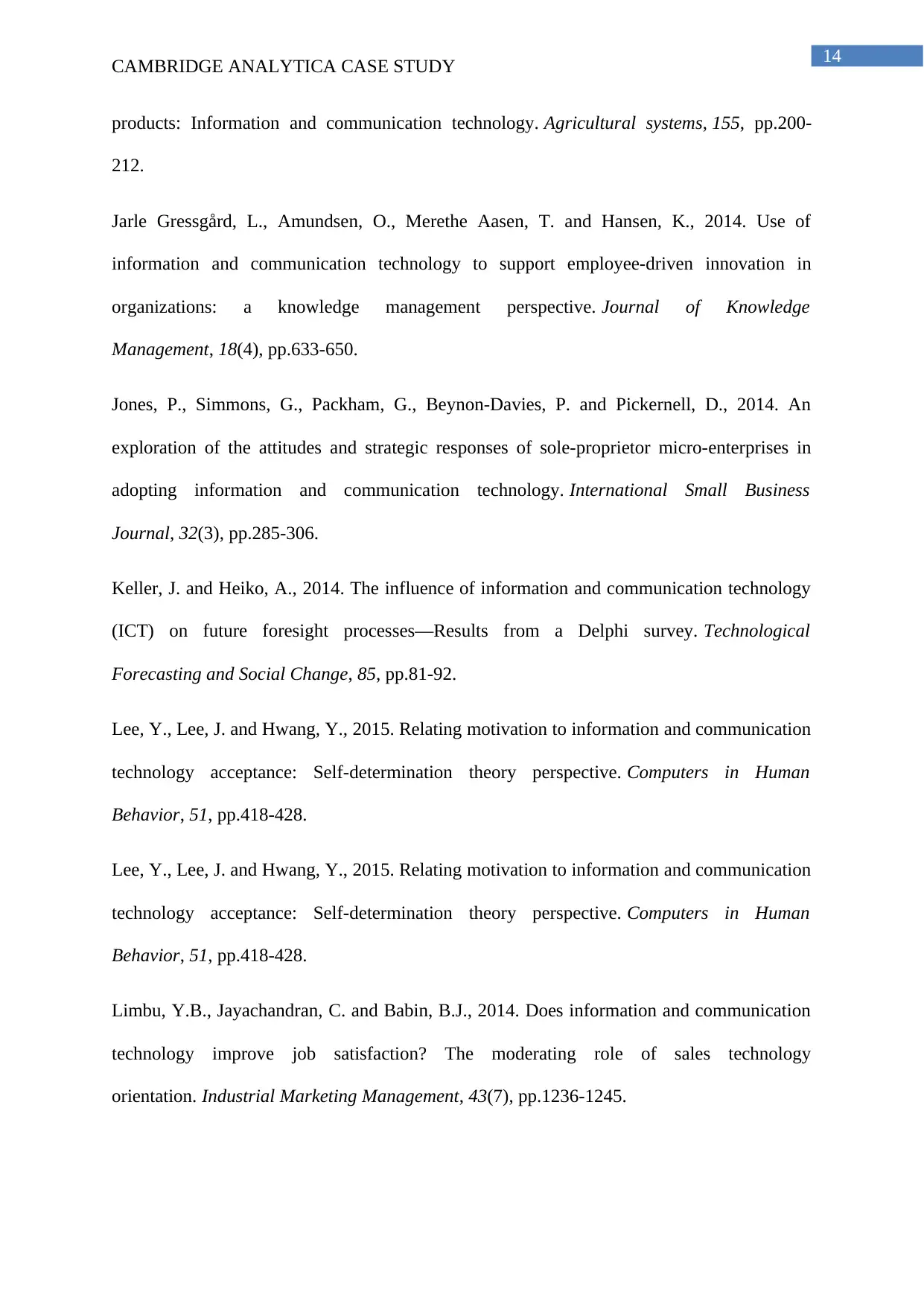
14
CAMBRIDGE ANALYTICA CASE STUDY
products: Information and communication technology. Agricultural systems, 155, pp.200-
212.
Jarle Gressgård, L., Amundsen, O., Merethe Aasen, T. and Hansen, K., 2014. Use of
information and communication technology to support employee-driven innovation in
organizations: a knowledge management perspective. Journal of Knowledge
Management, 18(4), pp.633-650.
Jones, P., Simmons, G., Packham, G., Beynon-Davies, P. and Pickernell, D., 2014. An
exploration of the attitudes and strategic responses of sole-proprietor micro-enterprises in
adopting information and communication technology. International Small Business
Journal, 32(3), pp.285-306.
Keller, J. and Heiko, A., 2014. The influence of information and communication technology
(ICT) on future foresight processes—Results from a Delphi survey. Technological
Forecasting and Social Change, 85, pp.81-92.
Lee, Y., Lee, J. and Hwang, Y., 2015. Relating motivation to information and communication
technology acceptance: Self-determination theory perspective. Computers in Human
Behavior, 51, pp.418-428.
Lee, Y., Lee, J. and Hwang, Y., 2015. Relating motivation to information and communication
technology acceptance: Self-determination theory perspective. Computers in Human
Behavior, 51, pp.418-428.
Limbu, Y.B., Jayachandran, C. and Babin, B.J., 2014. Does information and communication
technology improve job satisfaction? The moderating role of sales technology
orientation. Industrial Marketing Management, 43(7), pp.1236-1245.
CAMBRIDGE ANALYTICA CASE STUDY
products: Information and communication technology. Agricultural systems, 155, pp.200-
212.
Jarle Gressgård, L., Amundsen, O., Merethe Aasen, T. and Hansen, K., 2014. Use of
information and communication technology to support employee-driven innovation in
organizations: a knowledge management perspective. Journal of Knowledge
Management, 18(4), pp.633-650.
Jones, P., Simmons, G., Packham, G., Beynon-Davies, P. and Pickernell, D., 2014. An
exploration of the attitudes and strategic responses of sole-proprietor micro-enterprises in
adopting information and communication technology. International Small Business
Journal, 32(3), pp.285-306.
Keller, J. and Heiko, A., 2014. The influence of information and communication technology
(ICT) on future foresight processes—Results from a Delphi survey. Technological
Forecasting and Social Change, 85, pp.81-92.
Lee, Y., Lee, J. and Hwang, Y., 2015. Relating motivation to information and communication
technology acceptance: Self-determination theory perspective. Computers in Human
Behavior, 51, pp.418-428.
Lee, Y., Lee, J. and Hwang, Y., 2015. Relating motivation to information and communication
technology acceptance: Self-determination theory perspective. Computers in Human
Behavior, 51, pp.418-428.
Limbu, Y.B., Jayachandran, C. and Babin, B.J., 2014. Does information and communication
technology improve job satisfaction? The moderating role of sales technology
orientation. Industrial Marketing Management, 43(7), pp.1236-1245.
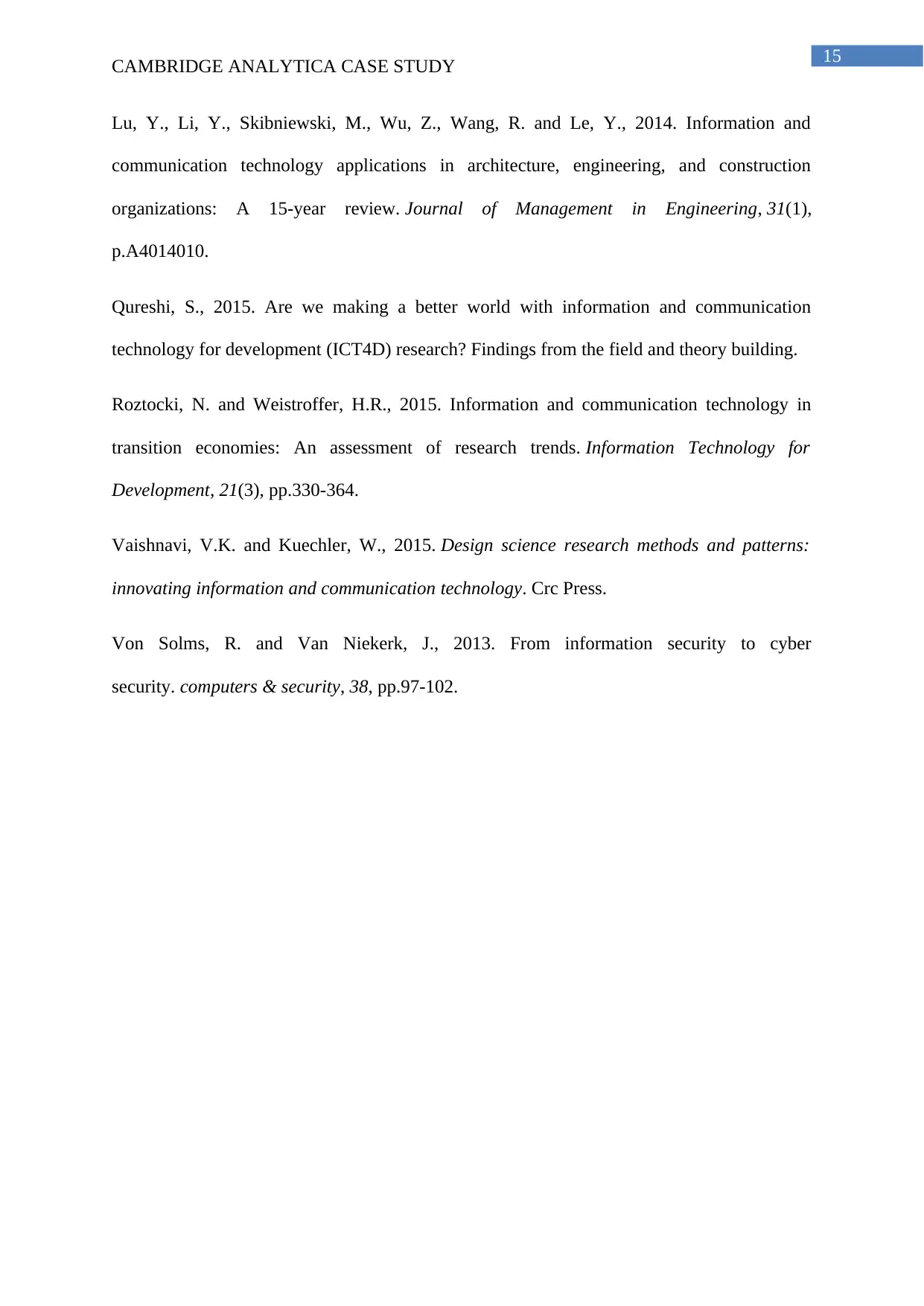
15
CAMBRIDGE ANALYTICA CASE STUDY
Lu, Y., Li, Y., Skibniewski, M., Wu, Z., Wang, R. and Le, Y., 2014. Information and
communication technology applications in architecture, engineering, and construction
organizations: A 15-year review. Journal of Management in Engineering, 31(1),
p.A4014010.
Qureshi, S., 2015. Are we making a better world with information and communication
technology for development (ICT4D) research? Findings from the field and theory building.
Roztocki, N. and Weistroffer, H.R., 2015. Information and communication technology in
transition economies: An assessment of research trends. Information Technology for
Development, 21(3), pp.330-364.
Vaishnavi, V.K. and Kuechler, W., 2015. Design science research methods and patterns:
innovating information and communication technology. Crc Press.
Von Solms, R. and Van Niekerk, J., 2013. From information security to cyber
security. computers & security, 38, pp.97-102.
CAMBRIDGE ANALYTICA CASE STUDY
Lu, Y., Li, Y., Skibniewski, M., Wu, Z., Wang, R. and Le, Y., 2014. Information and
communication technology applications in architecture, engineering, and construction
organizations: A 15-year review. Journal of Management in Engineering, 31(1),
p.A4014010.
Qureshi, S., 2015. Are we making a better world with information and communication
technology for development (ICT4D) research? Findings from the field and theory building.
Roztocki, N. and Weistroffer, H.R., 2015. Information and communication technology in
transition economies: An assessment of research trends. Information Technology for
Development, 21(3), pp.330-364.
Vaishnavi, V.K. and Kuechler, W., 2015. Design science research methods and patterns:
innovating information and communication technology. Crc Press.
Von Solms, R. and Van Niekerk, J., 2013. From information security to cyber
security. computers & security, 38, pp.97-102.
1 out of 16
Related Documents
Your All-in-One AI-Powered Toolkit for Academic Success.
+13062052269
info@desklib.com
Available 24*7 on WhatsApp / Email
![[object Object]](/_next/static/media/star-bottom.7253800d.svg)
Unlock your academic potential
© 2024 | Zucol Services PVT LTD | All rights reserved.





